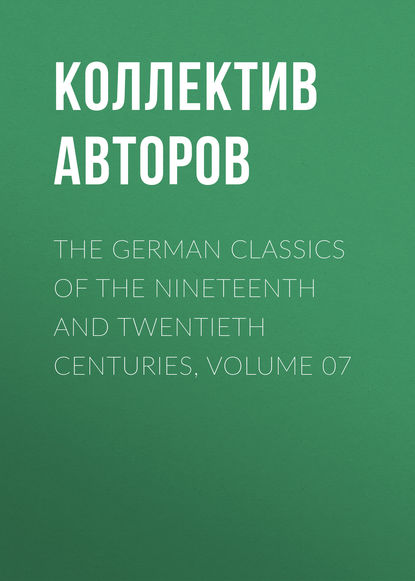По всем вопросам обращайтесь на: info@litportal.ru
(©) 2003-2024.
✖
The German Classics of the Nineteenth and Twentieth Centuries, Volume 07
Настройки чтения
Размер шрифта
Высота строк
Поля
The Count was loth to stop singing, and the last four lines of the impromptu terzetto suddenly became a so-called "endless canon," and Franziska's aunt had wit and confidence enough to add all sorts of ornamentation in her quavering soprano. Mozart promised afterward to write out the song at leisure, according to the rules of the art, and he did send it to the Count after he returned to Vienna.
Eugenie had long ago quietly examined her inheritance from the shrubbery of "Tiberius," and presently some one asked to hear the new duet from her and Mozart. The uncle was glad to join in the chorus, and all rose and hastened to the piano, in the large salon.
The charming composition aroused the greatest enthusiasm; but its very character was a temptation to put music to another use, and indeed it was Mozart himself who gave the signal, as he left the piano, to ask Franziska for a waltz, while Max took up his violin. The Count was not slow in doing the honors for Madame Mozart, and one after another joined in the dance. Even Franziska's aunt became young again as she trod the minuet with the gallant Lieutenant. Finally, as Mozart and the fair Eugenie finished the last dance, he claimed his promised privilege.
It was now almost sunset, and the garden was cool and pleasant. There the Countess invited the ladies to rest and refresh themselves, while the Count led the way to the billiard room, for Mozart was known to be fond of the game.
We will follow the ladies.
After they had walked about they ascended a little slope, half inclosed by a high vine-covered trellis. From the hill they could look off into the fields, and down into the streets of the village. The last rosy rays of sunlight shone in through the leaves.
"Could we not sit here for a little," suggested the Countess, "if Madame Mozart would tell us about herself and her husband?"
Madame Mozart was willing enough, and her eager listeners drew their chairs close about her.
"I will tell you a story that you must know in order to understand a little plan of mine. I wish to give to the Baroness-to-be a souvenir of a very unusual kind. It is no article of luxury or of fashion but it is interesting solely because of its history."
"What can it be, Eugenie?" asked Franziska. "Perhaps the ink-bottle of some famous man." "Not a bad guess. You shall see the treasure within an hour; it is in my trunk. Now for the story and with your permission it shall begin back a year or more.
"The winter before last, Mozart's health caused me much anxiety, on account of his increasing nervousness and despondency. Although he was now and then in unnaturally high spirits when in company, yet at home he was generally silent and depressed, or sighing and ailing. The physician recommended dieting and exercise in the country. But his patient paid little heed to the good advice; it was not easy to follow a prescription which took so much time and was so directly contrary to all his plans and habits. Then the doctor frightened him with a long lecture on breathing, the human blood, corpuscles, phlogiston, and such unheard-of things; there were dissertations on Nature and her purposes in eating, drinking, and digestion—a subject of which Mozart was, till then, as ignorant as a five-year-old child.
"The lesson made a distinct impression. For the doctor had hardly been gone a half hour when I found my husband, deep in thought but of a cheerful countenance, sitting in his room and examining a walking-stick which he had ferreted out of a closet full of old things. I supposed that he had entirely forgotten it. It was a handsome stick, with a large head of lapis lazuli, and had belonged to my father. But no one had ever before seen a cane in Mozart's hand, and I had to laugh at him.
"'You see,' he cried, 'I have surrendered myself to my cure, with all its appurtenances. I will drink the water, and take exercise every day in the open air, with this stick as my companion. I have been thinking about it; there is our neighbor, the privy-councilor, who cannot even cross the street to visit his best friend without his cane; tradesmen and officers, chancellors and shop-keepers, when they go with their families on Sunday for a stroll in the country, carry each one his trusty cane. And I have noticed how in the Stephansplatz, a quarter of an hour before church or court, the worthy citizens stand talking in groups and leaning on their stout sticks, which, one can see, are the firm supports of their industry, order, and tranquillity. In short, this old-fashioned and rather homely custom must be a blessing and a comfort. You may not believe it, but I am really impatient to go off with this good friend for my first constitutional across the bridge. We are already slightly acquainted, and I hope that we are partners for life.'
"The partnership was but a brief one, however. On the third day of their strolls the companion failed to return. Another was procured, and lasted somewhat longer; and, at any rate, I was thankful to Mozart's sudden fancy for canes, since it helped him for three whole weeks to carry out the doctor's instructions. Good results began to appear; we had almost never seen him so bright and cheerful. But after a while the fancy passed, and I was in despair again. Then it happened that, after a very fatiguing day, he went with some friends who were passing through Vienna to a musical soirée. He promised faithfully that he would stay but an hour, but those are always the occasions when people most abuse his kindness, once he is seated at the piano and lost in music; for he sits there like a man in a balloon, miles above the earth, where one cannot hear the clocks strike. I sent twice for him, in the middle of the night; but the servant could not even get a word with him. At last, at three in the morning, he came home, and I made up my mind that I must be very severe with him all day."
Here Madame Mozart passed over some circumstances in silence. It was not unlikely that the Signora Malerbi (a woman with whom Frau Constanze had good reason to be angry) would have gone also to this soirée. The young Roman singer had, through Mozart's influence, obtained a place in the opera, and without doubt her coquetry had assisted her in winning his favor. Indeed, some gossips would have it that she had made a conquest of him, and had kept him for months on the rack. However that may have been, she conducted herself afterward in the most impertinent and ungrateful manner, and even permitted herself to jest at the expense of her benefactor. So it was quite like her to speak of Mozart to one of her more fortunate admirers as un piccolo grifo raso (a little well-shaven pig). The comparison, worthy of a Circe, was the more irritating because one must confess that it contained a grain of truth.
As Mozart was returning from this soirée (at which, as it happened, the singer was not present), a somewhat excited friend was so indiscreet as to repeat to him the spiteful remark. It was the more amazing to him because it was the first unmistakable proof of the utter ingratitude of his protegée. In his great indignation he did not notice the extreme coolness of Frau Constanze's reception. Without stopping to take breath he poured out his grievance, and well-nigh roused her pity; yet she held conscientiously to her determination that he should not so easily escape punishment. So when he awoke from a sound sleep shortly after noon, he found neither wife nor children at home, and the table was spread for him alone.
Ever since Mozart's marriage there had been little which could make him so unhappy as any slight cloud between his better half and himself. If he had only known how heavy an anxiety had burdened her during the past few days! But, as usual, she had put off as long as possible the unpleasant communication. Her money was now almost spent, and there was no prospect that they should soon have more. Although Mozart did not guess this state of affairs, yet his heart sank with discouragement and uncertainty. He did not wish to eat; he could not stay in the house. He dressed himself quickly, to go out into the air. On the table he left an open note in Italian:
"You have taken a fair revenge, and treated me quite as I deserved. But be kind and smile again when I come home, I beg you. I should like to turn Carthusian or Trappist and make amends for my sins."
Then he took his hat, but not his cane—that had had its day—and set off.
Since we have excused Frau Constanze from telling so much of her story we may as well spare her a little longer. The good man sauntered along past the market toward the armory—it was a warm, sunshiny, summer afternoon—and slowly and thoughtfully crossed the Hof, and, turning to the left, climbed the Mölkenbastei, thus avoiding the greetings of several acquaintances who were just entering the town.
Although the silent sentinel who paced up and down beside the cannon did not disturb him, he stopped but a few minutes to enjoy the beautiful view across the green meadows and over the suburbs to the Kahlenberg. The peaceful calm of nature was too little in sympathy with his thoughts. With a sigh he set out across the esplanade, and so went on, without any particular aim, through the Alser-Vorstadt.
At the end of Währinger Street there was an inn, with a bowling alley; the proprietor, a master rope-maker, was as well known for his good beer as for the excellence of his ropes. Mozart heard the balls and saw a dozen or more guests within. A half-unconscious desire to forget himself among natural and unassuming people moved him to enter the garden. He sat down at one of the tables—but little shaded by the small trees—with an inspector of the water-works and two other Philistines, ordered his glass of beer, joined in their conversation, and watched the bowling.
Not far from the bowling-ground, toward the house, was the open shop of the rope-maker. It was a small room, full to overflowing; for, besides the necessaries of his trade, he had for sale all kinds of dishes and utensils for kitchen, cellar, and farm-oil and wagon grease, also seeds of various kinds, and dill and cheap brandy. A girl, who had to serve the guests and at the same time attend to the shop, was busy with a countryman, who, leading his little boy by the hand, had just stepped up to make a few purchases—a measure for fruit, a brush, a whip. He would choose one article, try it, lay it down, take up a second and a third, and go back, uncertainly, to the first one; he could not decide upon any one. The girl went off several times to wait on the guests, came back, and with the utmost patience helped him make his choice.
Mozart, on a bench near the alley, saw and heard, with great amusement, all that was going on. As much as he was interested in the good, sensible girl, with her calm and earnest countenance, he was still more entertained by the countryman who, even after he had gone, left Mozart much to think about. The master, for the time being, had changed places with him; he felt how important in his eyes was the small transaction, how anxiously and conscientiously the prices, differing only by a few kreutzers, were considered. "Now," he thought, "the man will go home to his wife and tell her of his purchases, and the children will all wait until the sack is opened, to see if it holds anything for them; while the good wife will hasten to bring the supper and the mug of fresh home-brewed cider, for which her husband has been keeping his appetite all day. If only I could be as happy and independent waiting only on Nature, and enjoying her blessings though they be hard to win! But if my art demands of me a different kind of work, that I would not, after all, exchange for anything in the world, why should I meanwhile remain in circumstances which are just the opposite of such a simple and innocent life? If I had a little land in a pleasant spot near the village, and a little house, then I could really live. In the mornings I could work diligently at my scores; all the rest of the time I could spend with my family. I could plant trees, visit my garden, in the fall gather apples and pears with my boys, now and then take a trip to town for an opera, or have a friend or two with me—what delight! Well, who knows what may happen!"
He walked up to the shop, spoke to the girl, and began to examine her stock more closely. His mind had not quite descended from its idyllic flight, and the clean, smooth, shining wood, with its fresh smell, attracted him. It suddenly occurred to him that he would pick out several articles for his wife, such as she might need or might like to have. At his suggestion, Constanze had, a long time ago, rented a little piece of ground outside the Kärnthner Thor, and had raised a few vegetables; so now it seemed quite fitting to invest in a long rake and a small rake and a spade. Then, as he looked further, he did honor to his principles of economy by denying himself, with an effort and after some deliberation, a most tempting churn. To make up for this, however, he chose a deep dish with a cover and a prettily carved handle; for it seemed a most useful article. It was made of narrow strips of wood, light and dark, and was carefully varnished. There was also a particularly fine choice of spoons, bread-boards, and plates of all sizes, and a salt-box of simple construction to hang on the wall.
At last he spied a stout stick, which had a handle covered with leather and studded with brass nails. As the strange customer seemed somewhat undecided about this also, the girl remarked with a smile that that was hardly a suitable stick for a gentleman to carry. "You are right, child," he answered. "I think I have seen butchers carry such sticks. No, I will not have it. But all the other things which we have laid out you may bring to me today or tomorrow." And he gave his name and address. Then he went back to the table to finish his beer. Only one of his former companions was sitting there, a master-tinker.
"The girl there has had a good day for once," he remarked. "Her uncle gives her a commission on all that she sells."
Mozart was now more pleased with his purchase than ever. But his interest was to become still greater. For, in a moment, as the girl passed near, the tinker called out, "Well, Crescenz, how is your friend the locksmith? Will he soon be filing his own iron?" "Oh," she answered without stopping, "that iron is still growing deep in the mountain."
"She is a good goose," said the tinsmith. "For a long time she kept house for her stepfather, and took care of him when he was ill; but after he died it came out that he had spent all her money. Since that she has lived with her uncle, and she is a treasure, in the shop, in the inn, and with the children. There is a fine young apprentice who would have liked to marry her long ago, but there is a hitch somewhere."
"How so? Has he nothing to live on?"
"They both have saved a little, but not enough. Now comes word of a good situation and a part of a house in Ghent. Her uncle could easily lend them the little money that they need, but of course he will not let her go. He has good friends in the council and in the union, and the young fellow is meeting with all sorts of difficulties."
"The wretches!" cried Mozart, so loud that the other looked around anxiously, fearing that they might have been overheard. "And is there no one who could speak the right word or show those fellows a fist? The villains! We will get the best of them yet."
The tinker was on thorns. He tried, clumsily enough, to moderate his statements, and almost contradicted himself. But Mozart would not listen. "Shame on you, how you chatter! That's just the way with all of you as soon as you have to answer for anything!" And with that he turned on his heel and left the astonished tinker. He hastened to the girl, who was busy with new guests: "Come early tomorrow, and give my respects to your good friend. I hope that your affairs will prosper." She was too busy and too much surprised to thank him.
He retraced his way to the city at a quick pace, for the incident had stirred his blood. Wholly occupied with the affairs of the poor young couple, he ran over in his mind a list of his friends and acquaintances who might be able to help them. Then, since it was necessary to have more particulars from the girl before he could decide upon any step, he dismissed the subject from his thoughts and hastened eagerly toward home.
He confidently expected a more than cordial welcome and a kiss at the door, and longing redoubled his haste. Presently the postman called to him and handed him a small but heavy parcel, which was addressed in a fair clear hand which he at once recognized. He stepped into the first shop to give the messenger his receipt, but when once in the street again his impatience was not to be checked, so he broke the seal, and, now walking, now standing still, devoured his letter.
"I was sitting at my sewing-table," continued Madame Mozart, in her story, "and heard my husband come upstairs and ask the servant for me. His step and tone were more cheerful and gay than I had expected, and more so than I quite liked. He went first to his room, but came immediately to me. 'Good-evening!' he said. I answered him quietly, without looking up. After walking across the room once or twice, with a smothered yawn he took up the fly-clap from behind the door—a most unusual proceeding—and remarking, 'Where do all these flies come from?' began to slap about, as loudly as possible. The noise is particularly unpleasant to him, and I had been careful not to let him hear it. 'H'm,' I thought, 'when he does it himself it's another matter.' Besides, I had not noticed many flies. His strange behavior vexed me much. 'Six at a blow!' he cried. 'Do you see?' No answer. Then he laid something on the table before me, so near that I could not help seeing it without lifting my eyes from my work. It was nothing less than a heap of ducats. He kept on with his nonsense behind my back, talking to himself, and giving a slap now and then. 'The disagreeable good-for-nothing beasts! What were they put in the world for"' Pitsch. 'To be killed, I suppose!' Patsch. 'Natural history teaches us how rapidly their numbers multiply.' Pitsch, patsch. 'In my house they are soon dispatched. Ah, maledette! disperate! Here are twenty more. Do you want them?' And he came and laid down another pile of gold. I had had hard work to keep from laughing, and could hold out no longer. He fell on my neck and we laughed as if for a wager.
"'But where did the money come from' I asked, as he shook the last pieces from the roll. 'From Prince Esterhazy,[33 - The friend and patron of Haydn, to whose support and interest we owe many works of art.] rough Haydn. Read the letter.' I read:
"'Eisenstadt, Etc.
"'My good friend.—His Highness has, to my great delight, intrusted me with the errand of sending to you these 60 ducats. We have been playing your quartettes again, and his Highness was even more charmed and delighted than at the first hearing, three months ago. He said to me (I must write it word for word): "When Mozart dedicated these works to you, he thought to honor you alone. Yet he cannot take it amiss if I find in them a compliment to myself also. Tell him that I think as highly of his genius as you do, and more than that he could not wish." "Amen," said I. Are you satisfied?
"'Postscript (for the ear of the good wife).—Take care that the acknowledgment be not too long delayed. A note from Mozart himself would be best. We must not lose so favorable a breeze.'
"'You angel! You divine creature!' cried Mozart again and again. It would be hard to say which pleased him most, the letter, or the praise of the prince, or the money. I confess that just then the money appealed most to me. We passed a very happy evening, as you may guess.
"Of the affair in the suburb I heard neither that day nor the next. The whole week went by; no Crescenz appeared, and my husband, in a whirl of engagements, soon forgot her. One Sunday evening we had a small musicale. Captain Wasselt, Count Hardegg, and others were there. During a pause I was called out, and there was the outfit. I went back to the room and asked, 'Have you ordered a lot of woodenware from the Alservorsstadt?'
"'By thunder, so I did! I suppose the girl is here? Tell her to come in.'
"So in she came, quite at ease, with rakes, spades, and all, and apologized for her delay, saying that she had forgotten the name of the street and had only just found it. Mozart took the things from her, one after another, and handed them to me with great satisfaction. I thanked him and was pleased with everything, praising and admiring, though I wondered all the time what he had bought the garden tools for.
"'For your garden,' he said.
"'Goodness! we gave that up long ago, because the river did so much damage; and besides we never had good luck with it. I told you, and you didn't object.'
"'What! And so the asparagus that we had this spring—'
"'Was always from the market!'
"'Hear that! If I had only known it! And I praised it just out of pity for your poor garden, when really the stalks were no bigger than Dutch quills.'
"The guests enjoyed the fun, and I had to give them some of the unnecessary articles at once. And when Mozart inquired of the girl about the prospects of her marriage, and encouraged her to speak freely, assuring her that whatever assistance we could offer should be quietly given and cause her no trouble, she told her story with so much modesty and discretion that she quite won her audience, and was sent away much encouraged.

















